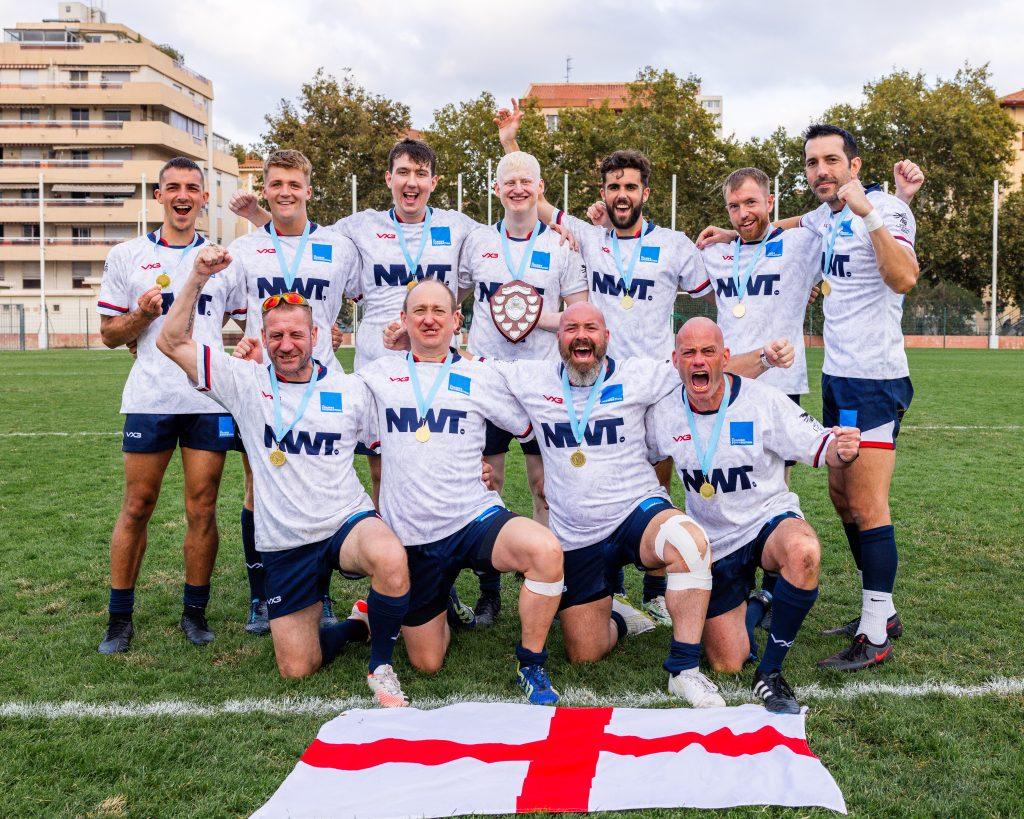As the Rugby World Cup quarter-finalists prepared to do battle – Wales and Argentina quite literally down the road – three other international teams took to the field in the French city of Toulon.
The England team, captained by Jack Pearce, emerged victorious in the inaugural Tri-Nations Rugby Challenge.
They overcame a very spirited Irish team in the final by 15 points to five, after completing a clean sweep in the group stages with two wins over the Irish and another two over France.
VI rugby was created by The Change Foundation seven years ago. It is based on the seven-a-side version of the game and is a fast-moving spectacle which reflects the skills of the mainstream game.
A financial contribution of 50,000 pounds from the Wasps Legends foundation was a major contributions to the starts of the sport, which is now played in France, New Zealand, Japan, Wales, Italy, Ireland and England.
Watching the finals was former Wasps, England and British and Irish Lions player Simon Shaw, who took the field during an earlier VI Rugby England tour to Japan.
He said: “It’s excellent to see how the game has moved on and the skills of the players have developed over the years. It’s fast and extremely skillful. It is great that Wasps Legends played such an important role in the creation of this sport.”
Speaking after one training session, which saw a spectacular try run in by guest player and TCF ambassador Stuart Flashman-Moore, England’s Paul Handley said: “The first five to 10 minutes were a bit frantic as we were all so pumped-up. But then things became more controlled and the communication levels really went up and that is a key for us.”
After celebrating the victory Captain Jack praised his players and congratulated Ireland’s Ian McKinley, a star of the tournament, on a fierce contest.
He said: “It’s a responsibility to be the captain and it is a big part of my life. I try and be the best I can possibly be and bring out the best in the others. When I reflect on it I am really proud.
“Among the strengths we have as a team is the connections which we have built. We have a settled side now and we are really close as a group. Obviously rugby is the reason we are together but there is also the comradeship we have developed, that connectivity has created a friendship and a family.”
His father Neil Pearce explained how his son came to be involved in the England team.
“Jack, aged 26, now lives in Manchester and works as a primary school teacher,” he said.
“He has been part of the England VI Rugby Team for five years and is now captain. He has albinism and one of his conditions is the nerves in his eye are tangled, he has involuntary movement of eyes and they let in too much light. It’s a bit like being dazzled. But the conditions are not degenerative.
“Being part of the England team has given him a real sense of belonging and as captain he takes a lead and brings the other players along with him. He is also confident that he is the right man for the job. And of course I am very proud.
“The team has been working together for a few years now and I have seen them move to another level. There is a great balance withing the squad, they are all aware of each other’s strengths and limitations and respond accordingly.
“It is fantastic that The Change Foundation had the foresight and the vision to create this sport”
Integration and diversification are an important part of the game which uses the team spirit, discipline and passion rugby forges to reach into the players’ everyday lives, giving them confidence, independence and promoting such physical traits as spatial awareness and movement skills.
Ireland had a number of women players in their squad and this is an area TCF want to develop further.
However, currently only around 10 per cent of the players, coaches and officials are female and the charity’s Programmes Manager Elle Rowley is leading the drive to get more women and girls involved.
“I have had so much enjoyment from playing club rugby and the friendships developed last a lifetime and I want all visually impaired players – male and female – to experience the buzz of competing in high quality rugby and perhaps even representing their country,” she said.
TCF’s Operations Director Alex Bassan was instrumental in creating the rules and coaching guidelines for the sport and has trained the 300 coaches and officials who now support the 700 players from around the world. His work has been recognised by his inclusion in the Mastercard Future XV, a squad of sports pioneers changing the face of rugby globally. His work has been recognised by the Mastercard Future XV, a squad of sporting pioneers changing the face of rugby globally.
Alex said: “Our aim is to double the number of players each year and hold an annual Six Nations competition with a World Cup every four years. The next countries in our sights are Fiji, Georgia, the USA and Australia, who host the 2025 British and Irish Lions and the 2027 Rugby World Cup.”
Written by Nick Ames

